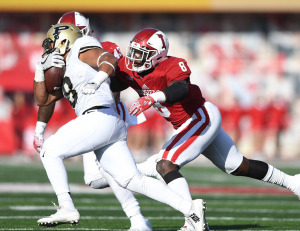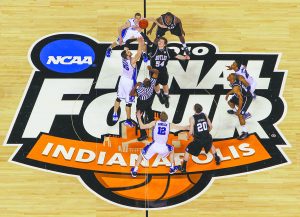NCAA basketball season set to open day before Thanksgiving
The Division I Council voted Wednesday to delay the start date from the originally scheduled Nov. 10 as one of several precautions against the spread of coronavirus.
The Division I Council voted Wednesday to delay the start date from the originally scheduled Nov. 10 as one of several precautions against the spread of coronavirus.
The NCAA is working to change its rules restricting athletes from earning money for things such as endorsements, in-person appearances and social media posts.
Tom Jernstedt worked his first men’s basketball tournament as director of events for the NCAA in 1973 and has widely been credited with transforming it into the billion-dollar March Madness it has become today.

The NCAA will furlough its entire Indianapolis-based staff of about 600 employees in a cost-saving move, according to memo obtained Wednesday by The Associated Press.

The conference is in the early stages of a complicated process that also involves broadcast partners and possible neutral site venues, but could have a season starting as soon as Thanksgiving weekend.
The NCAA and the Indiana Sports Corp. both said they’re still planning for the Final Four on its original dates. Some sports business experts wonder whether the college basketball tournament could benefit from a “bubble” strategy like the NBA or NHL.

The Division I Council made a similar decision for spring-sport athletes who had their seasons cut short by the coronavirus.

The NCAA Division I Council meets Wednesday to consider what will happen with the eligibility of fall sport athletes and whether fall sports championships should be staged in the spring.
The NCAA’s insurance payout for March Madness is perhaps the largest for a pandemic-related event cancellation thus far.

The highest tier of Division I football, the Bowl Subdivision, is not affected because it is not overseen by the NCAA.

Within hours of the board’s announcement, the Division III presidents council canceled fall sports championship and determined they will not be made up in the spring.
More than two dozen Division I conferences had urged the NCAA’s highest governing body to delay a decision on fall championships until a majority of leagues determine whether to hold regular-season competition.

The NCAA football oversight committee is asking the association’s Board of Governors to avoid making a decision soon on whether to conduct fall championships, “so that conferences and schools may have ample latitude to continue to evaluate the viability of playing football this fall.”

The NCAA handed down its latest guidelines for playing through a pandemic while also sounding an alarm: The prospect of having a fall semester with football and other sports is looking grim.
The NCAA on Friday expanded its policy banning states with prominent Confederate symbols from hosting its sponsored events, one day after the Southeastern Conference made a similar declaration.

Florida Sen. Marco Rubio’s bill would protect the NCAA from being challenged in court if the association changes its rules to allow athletes to earn money for endorsement deals and personal appearances.

The appeals court ruling clears the way for Division I conferences to independently set rules for education-related compensation provided to student-athletes.
Dr. Brian Hainline expressed cautious optimism that college sports could be played during the fall semester, but “it’s not going to be risk-free, that’s for sure.”
The federal lawsuit accuses the organization of failing to address gender-based violence by male athletes against female students at colleges and universities.

The NCAA is about to drastically change its rules regarding amateurism, which raises plenty of questions. Here are some answers.